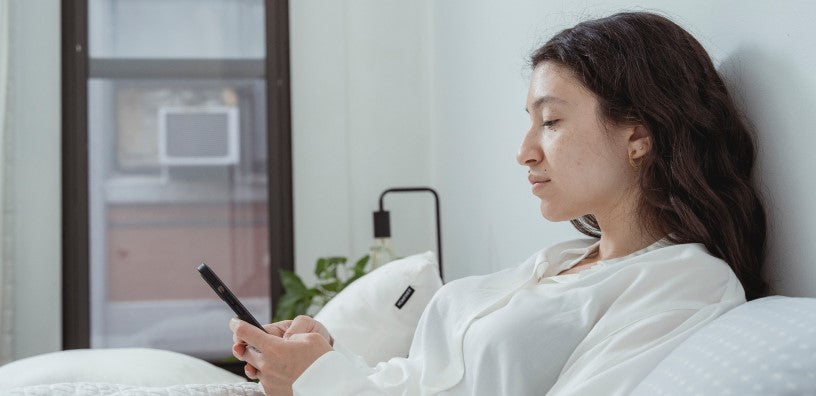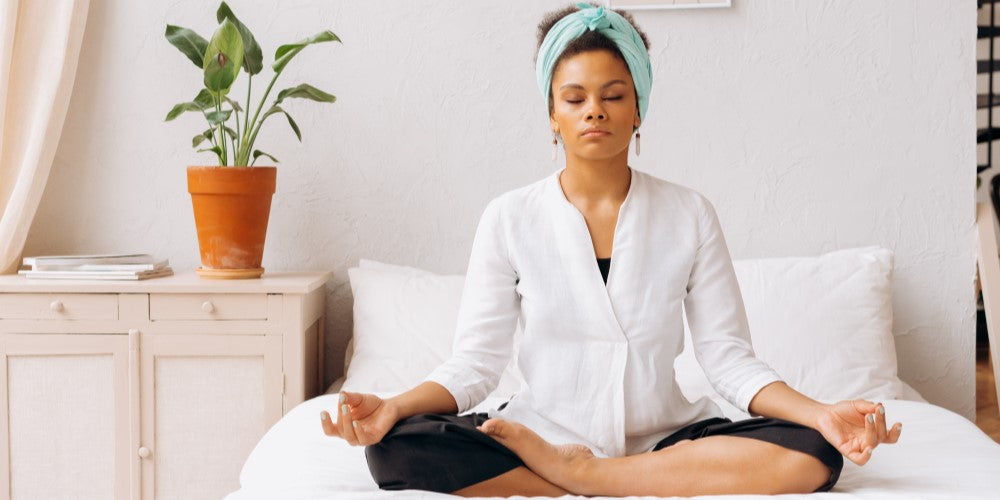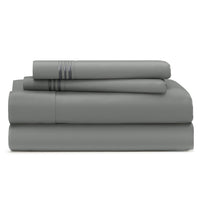
8 Quick Tips to Fall Asleep Fast
It is often frustrating to lie in bed without being able to fall asleep. Whether you are feeling tired or have an early morning, you can’t seem to close your eyes and drift off, no matter how hard you try. The good news is that this is common among many people, and there are several steps you can take to help your body fall asleep faster at night.
Oftentimes, the inability to fall asleep is caused by disruptions to our circadian rhythm. Essentially, the circadian rhythm is what controls the sleep-wake cycle, which lasts about 24 hours – like a biological clock. The circadian rhythm tells our bodies to stay awake during the day and to slow down during the night. However, there are several ways to disrupt the rhythm, throwing off our cycle and leading to negative effects like insomnia [1].
But don't fret! We have gathered some tips for you to keep from messing with the circadian rhythm and avoid tossing and turning when it's time to go to bed. Keep reading to find out more!
Don't Think About It
As you lie awake in bed, just about a million different topics will cross your mind. However, the one you should avoid at all costs is thinking about sleep itself. This one might be easier said than done, but the more you think about not being able to sleep, the less you’ll be able to actually do it.
The process of sleep is naturally synced with your body, so the more you attempt to force it, the more your mind will resist. The best thing to do is try to reduce your state of anxiety, relax your mind, and naturally drift off. Cosy House’s Lavender Linen Spray is the perfect way to help you enter that blissful state, providing a scent of pure freshness that soothe your senses and improve your sleep quality.
Take a Warm Shower
Taking a warm shower before bed has several benefits, other than making us feel cozy right before sleeping. Warm showers can relax the body, signaling that it's time to wind down and get ready for the day to end. Additionally, warm showers increase the blood flow to our hands and feet, through which heat escapes and allows for the body to cool down, sending another signal to the body that it is now time for bed [2].
Develop a Nightly Routine
By developing a nighttime routine before bed, your body will become accustomed to that routine and recognize when it is time for sleep. Instead of watching television or scrolling on social media for hours, a healthy nighttime routine may include habits such as:
- Reading a book
- Performing a skincare routine
- Writing a journal entry
- Drinking a hot tea
- Listening to calming music
- Meditating

Avoid Technology
In recent years, it has become increasingly difficult to distance ourselves from technology. With smartphones acting as extensions of our arms, it's no secret most people spend hours scrolling through social media before drifting off to sleep.
However, technology has drastic effects on our ability to sleep – cue our circadian rhythm here. The light emitted from our screens, known as blue light, disrupts our circadian rhythm at night. This kind of light mimics sunlight, tricking our brains into thinking it's still daytime and not time for sleep. Therefore, avoid the use of screens for at least half an hour before going to bed [3].
Invest in Comfortable Bedding
Your inability to fall asleep may be attributed to the fact that you’re simply not comfortable. It is important to invest in high-quality, comfortable bedding as it plays a big role in our ability to sleep.
Cosy House’s Luxury Bed Sheets bring you comfort throughout the entire night. They are made with a bamboo viscose and polyester blend which creates soft, breathable, and lightweight sheets. Also, their thermal-regulating properties help balance your body temperature to avoid night sweats. You’ll enjoy going to bed every night!
Additionally, Cosy House’s Luxury Pillow is the perfect way to keep your neck supported, not to mention provide you with cloud-like comfort. The Luxury Pillow is encased by hypoallergenic bamboo viscose material, warding off common household non-living allergens. Not only will your head and neck feel like they’re resting on a cloud, but you’re also less likely to lose sleep over a stuffy nose!
Play Calming Music
Music is known to affect how we feel, so it is not surprising that listening to music before bed has the ability to relax the mind and prepare you for bed. However, keep in mind that not all music types can have a calming effect – piano or a soft guitar is ideal for sleep, while metal music may not be the most relaxing. The ideal tempo for music to fall asleep to is around 98 BPM [4].
Additionally, white noise has been proven to aid those who have difficulty falling asleep and staying asleep. If you tend to get distracted by small noises as you’re lying in bed, white noise helps block them out, keeping a steady, uniform noise to help you fall asleep [5].

Mindfulness Meditation
Mindfulness meditation has recently risen in popularity, as its effects have been found very beneficial for several purposes. Meditation essentially consists of relaxation techniques, whether it be through breathing exercises or guided meditation [6]. In regards to sleeping, meditation can help relax the mind and body, putting away thoughts of stress, anxiety, and even reduce high blood pressure [7].
Be Mindful of What You Consume
The foods we consume play an essential role in our ability to sleep well. For instance, foods without a sufficient amount of vitamins A, C, D, E, and K are known to cause sleeping problems [8]. Similarly, saturated and processed foods, as well as foods that are high in sugar, tend to cause issues when it comes to sleep. For example, spicy foods and carbohydrates can cause acid reflux and high sugar levels that interrupt and reduce the amount of sleep [9].
Sleeping is a vital part of our well-being, affecting our mental health, physical health, and even our moods and behaviors. Therefore, it is important for us to increase the chances of getting a full night’s rest. If you are having trouble sleeping for one reason or another, keep these 8 tips in mind, and let us know which one works best for you!
If you are still experiencing symptoms of insomnia and a lack of sleep, consult a physician.
Want to get a jump start on improving your sleep quality? Cosy House has you covered with quality bedding for a blissful night of sleep! Click here to find out more.
We've gone ahead & enclosed a 10% off coupon below for you to use if you'd like to take the plunge and try out our sheets for yourself! To shop our collection & get 10% OFF Use the code 'BLOG10' at checkout.
Sources
-
Johnson, J. (2011, January 11). Circadian rhythms: How it works, what affects it, and more. Medical News Today. Retrieved from https://www.medicalnewstoday.com/articles/circadian-rhythms#what-affects-it
-
Pacheco, D. (2022, April 19). Do cold showers help you get more sleep? Sleep Foundation. Retrieved from https://www.sleepfoundation.org/sleep-hygiene/shower-before-bed#:~:text=Those%20who%20bathe%20or%20shower,heat%20to%20escape%20more%20quickly.
-
Cleveland Clinic. (2022, May 20). 3 reasons to ditch your phone before bed. Cleveland Clinic. Retrieved n.d., from https://health.clevelandclinic.org/put-the-phone-away-3-reasons-why-looking-at-it-before-bed-is-a-bad-habit/#:~:text=The%20light%20from%20your%20phone%20screen%20can%20have%20an%20impact&text=Studies%20have%20shown%20that%20the,tune%20with%20light%20and%20dark.
-
Dodds, L. (2019, September 26). The soundtrack to A better night's sleep. The Soundtrack To A Better Night's Sleep | Mattress Online. Retrieved n.d., from https://www.mattressonline.co.uk/blog/sleep-science/soundtrack-to-a-better-nights-sleep/
-
Riedy, S. M., Smith, M. G., Rocha, S., & Basner, M. (2020, September 9). Noise as a sleep aid: A systematic review. Sleep Medicine Reviews. Retrieved n.d., from https://www.sciencedirect.com/science/article/abs/pii/S1087079220301283
-
Pacheco, D. (2022, April 19). Can meditation treat insomnia? Sleep Foundation. Retrieved from https://www.sleepfoundation.org/insomnia/treatment/meditation#:~:text=Research%20suggests%20that%20various%20types,4%20and%20older%20adults5.
-
Corliss, J. (2020, June 15). Mindfulness meditation helps fight insomnia, improves sleep. Harvard Health. Retrieved from https://www.health.harvard.edu/blog/mindfulness-meditation-helps-fight-insomnia-improves-sleep-201502187726
-
Ikonte, C. J., Mun , J. G., Reider , C. A., Grant , R. W., & Mitmesser , S. H. (n.d.). Micronutrient inadequacy in short sleep: Analysis of the NHANES 2005-2016. Nutrients. Retrieved from https://pubmed.ncbi.nlm.nih.gov/31581561/
-
Suni, E. (2022, April 22). Nutrition and sleep: Diet's effect on sleep. Sleep Foundation. Retrieved from https://www.sleepfoundation.org/nutrition

